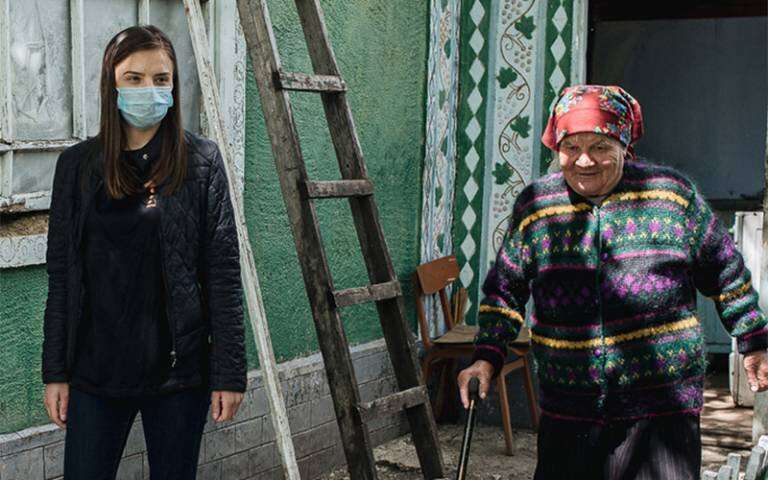A woman in Moldova with a youth volunteer during the COVID-19 pandemic. Credit: 2020 Dan Gutu/UNFPA Moldova
Providing tangible support to older people for carrying out day-to-day tasks like grocery shopping is essential for addressing loneliness, according to a new survey published today by UNFPA and led by a UCL researcher.
The survey was conducted in mid-2021 among people aged 65 to 85 in six countries and territories in Eastern Europe—Albania, Azerbaijan, Bosnia and Herzegovina, Georgia, Serbia, and Kosovo.
Professor Tara Keck (UCL Neuroscience, Physiology & Pharmacology), who led the survey, said: "The finding that a lack of tangible support is a prominent risk factor for loneliness provides a clear focus for targeted interventions to address loneliness in this population of older people. By addressing these needs, we can help support healthy aging for older people in the region."
The survey reveals that, in addition to lack of tangible support, risk factors for loneliness include a small social network, not having someone to do enjoyable things with, and a low level of social confidence.
On the other hand, the survey found limited association between levels of emotional support and loneliness.
Giulia Vallese, UNFPA Director a.i. for Eastern Europe and Central Asia, commented: "Loneliness presents a major risk for the physical and mental health of older people, and undermines efforts to promote healthy and active aging.
"This survey helps us better understand the risk factors for loneliness and what we can do to ensure that people feel less lonely in older age."
The spotlight the COVID-19 pandemic has put on the challenges many older people face is an opportunity for generating the political will to tackle loneliness and make progress in creating societies for all ages, Ms. Vallese added.
In Eastern Europe, populations are aging rapidly, due to a combination of increasing life expectancy, low fertility rates and high levels of outward migration. In this context, ensuring that people can age in good health and as active participants in society is key. However, eight in ten older people (79%) say they are moderately or extremely lonely, according to the survey.
Several risk factors were only mildly associated with loneliness: living alone, overall level of happiness, having sought support for mental health, hearing difficulties, lack of affectionate support, and closeness of relationships.
A number of other demographic measures were also not associated with loneliness, including marital status, gender, living in urban or rural areas, satisfaction with financial situation, overall health status, Internet access and usage, or the types of social activities undertaken before or during the COVID-19 pandemic.
Risk factors vary by country and territory, even though loneliness levels were similar across all six countries and territories included in the survey.
The survey report recommends the adoption of national policies that protect the rights and dignity of older people, with an emphasis on their health and well-being, and stresses the need for programming, both locally and nationally, to provide targeted tangible support for older people.
This could include mobile medical visits at home, community volunteers to provide day-to-day support, or phone or virtual medical and social support. Developing targeted group activities, in day centers or similar venues for healthy and active aging, can be one effective way to create and expand social networks for older people and provide community-based tangible support.
More information: Loneliness and Social Isolation Among Older People in the Eastern Europe and Central Asia Region. eeca.unfpa.org/en/publications … ope-and-central-asia
Provided by University College London























